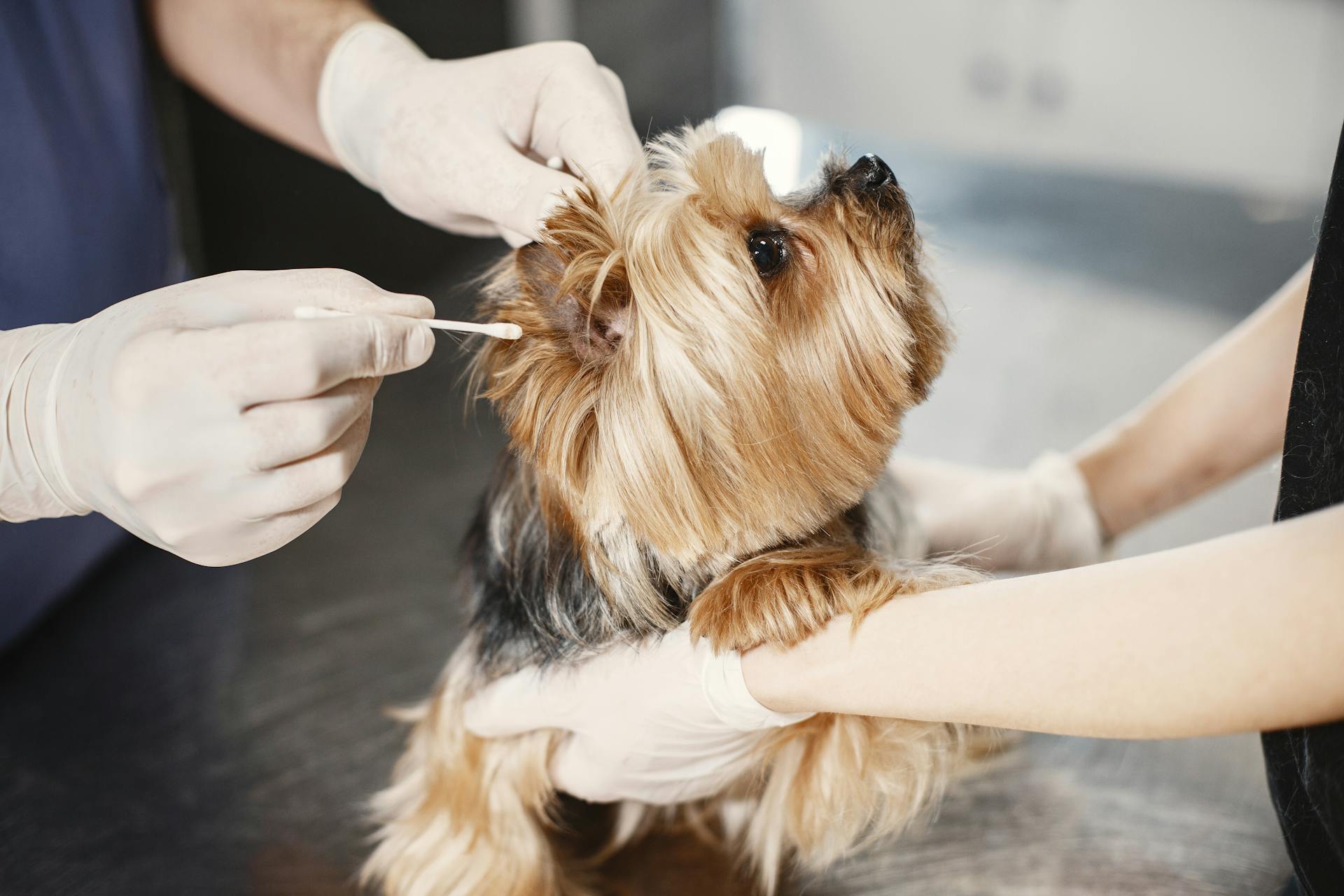
Chihuahuas are prone to hypoglycemia, a condition that occurs when their blood sugar levels drop too low, often due to skipping meals or eating too little.
This can be a serious issue, especially in puppies, as it can lead to seizures and even death if left untreated.
Chihuahuas are also susceptible to dental problems, such as tooth decay and gum disease, which can be caused by poor diet and lack of regular dental care.
Regular brushing and dental check-ups can help prevent these issues and keep your Chihuahua's teeth healthy.
Readers also liked: Homemade Dog Dental Treats
Common Health Problems
Chihuahuas are generally healthy, but like all dogs, they are predisposed to certain medical conditions. Their long lifespan is a testament to their overall health.
Hypoglycemia, or low blood sugar, is a common health issue in Chihuahuas. This can be caused by skipping meals or eating too little.
Patellar luxation, a condition where the kneecap slips out of place, is also a common problem in Chihuahuas. This can be painful and may require surgery.
Chihuahuas are prone to dental problems, including tooth decay and gum disease. Regular brushing and dental check-ups can help prevent these issues.
Collapsing trachea, a condition where the windpipe collapses, can be a serious health issue in Chihuahuas. This can cause coughing and difficulty breathing.
Dental issues can also lead to other health problems, such as kidney disease and heart disease, in Chihuahuas. Regular dental care can help prevent these complications.
Intriguing read: Dental Health Diets for Dogs
Dental and Eye Issues
Dental problems are a common issue in Chihuahuas due to their tiny mouths, which can lead to overcrowding of teeth and a buildup of plaque, tartar, and bacteria. This can cause severe infections and even tooth decay.
Chihuahuas are also prone to retaining their puppy teeth, which can cause the smaller teeth to be stuck in place. This can be painful and even lead to severe problems if not addressed by a vet.
To keep your Chi's mouth healthy, it's essential to brush their teeth daily and schedule regular dental cleanings. You can also help prevent dental disease by removing any lingering baby teeth.
Curious to learn more? Check out: Do Dog Dental Chews Work
Here are some common eye issues that can affect Chihuahuas:
- Glaucoma
- Chronic dry eye
- Cataracts
These conditions can be painful and even lead to blindness if left untreated. If you notice any signs of eye problems, such as red eyes, bulging eyes, or eye discharge, be sure to consult a veterinarian right away.
For more insights, see: Pug Dog Eyes Pop Out
Eye Problems
Eye problems can be a serious issue for Chihuahuas, and it's essential to keep an eye out for any signs of trouble.
Red eyes, bulging eyes, eye discharge, rubbing at the eyes due to pain, and blindness are all potential clinical signs of eye conditions in Chihuahuas.
Regular eye care is crucial to prevent and detect eye problems early on. Pet parents should wipe their Chihuahua's eyes once or twice a week to remove excess tearing or discharge.
Long-haired Chihuahuas may require professional grooming to remove hair around their eyes, which can cause irritation.
Some Chihuahuas may be more prone to severe eye issues, such as corneal dystrophy, a genetic condition that can cause a clear film to accumulate on the surface of the eye, leading to vision impairment.
Related reading: Pitbull Dog Signs
Dental
Dental problems are a common issue in Chihuahuas due to their tiny mouths, which can lead to overcrowding of teeth.
Overcrowding increases the risk of plaque, tartar, and bacteria building up, causing severe dental problems.
Unkempt tooth decay issues can lead to serious infections if left untreated.
Retained puppy teeth are another issue that can occur in Chihuahuas, causing smaller teeth to become stuck in place.
To prevent these problems, it's essential to brush your Chihuahua's teeth daily to prevent dental disease.
Regular dental cleanings and surgical removal of lingering baby teeth can also help keep your Chi's mouth healthy.
Periodontal disease, or dental disease, is commonly seen in Chihuahuas due to overcrowding of their small mouths.
Tartar build-up and plaque development are major contributors to this disease.
For your interest: How to Prevent Diabetes in Dogs
Mobility and Joint Issues
Mobility and joint issues are a common concern for Chihuahua owners. Over 20% of the Chihuahua population is affected by osteoarthritis, which can cause bad shoulder joints, knee joints, and hip problems.
Chihuahuas with joint problems can benefit from a healthy weight to reduce the burden on their joints. Making sure your Chihuahua doesn't become overweight is crucial, as extra weight can exacerbate joint issues. Physical therapy sessions and swimming are also great ways to help manage joint problems.
Common signs of arthritis in Chihuahuas include limping and lameness, stiffness, wincing or yelping when moving or touched in the affected area, and swollen joints. If you suspect your Chihuahua has arthritis, it's essential to consult with a veterinarian to determine the best course of action.
Here are some signs of joint issues in Chihuahuas:
- Limping and lameness
- Stiffness (particularly after periods of sitting or lying down)
- Wincing or yelping when moving or touched in the affected area
- Swollen joints
In severe cases of patellar luxation, surgery may be necessary to correct the issue. However, with a balanced diet, regular exercise, joint supplements, and physical therapy, you can help prevent this condition from worsening.
Joint Problems
Joint problems are a common issue in Chihuahuas, with over 20% of the population affected by osteoarthritis. This can cause significant pain and discomfort for your furry friend.
Glucosamine can be a helpful supplement to decrease the progression of joint problems or arthritis. Regular exercise and a healthy diet can also make a big difference.
As your Chihuahua ages, they may become more prone to joint problems, so it's essential to monitor their health closely. Making life easier for them can also help prevent pain and discomfort.
One way to make life easier for your Chihuahua is to use an indoor dog potty, which can reduce the strain on their joints. This can be especially helpful for dogs with grave joint problems.
Here are some signs of arthritis to look out for:
- Limping and lameness
- Stiffness, particularly after periods of sitting or lying down
- Wincing or yelping when moving or touched in the affected area
- Swollen joints
If you suspect your Chihuahua has joint problems, it's essential to consult with a veterinarian to determine the best course of action.
Legg-Calve-Perthes Disease
Legg-Calve-Perthes Disease is a degenerative hip condition found in Chihuahua puppies, typically between the ages of 6–9 months.
It's thought to be caused by decreased bloody supply to the hip, which can lead to serious consequences if left untreated.
The condition is characterized by the ball of the hip bone starting to die off, causing pain and fracture.
Surgery to remove the ball of the femur bone can be a remedy, decreasing pain and improving the pet's quality of life.
Digestive Issues
Digestive Issues can be a real concern for Chihuahua owners. Most episodes of diarrhoea are not serious, but it's essential to know when to contact your vet.
Dogs can have diarrhoea for many different reasons, including stress, changes to their diet, and parasites. If your Chihuahua's diarrhoea is accompanied by other signs, or if you're concerned about their health, contact your vet for advice.
Vomiting in Chihuahuas can be a sign of an underlying illness or health concern. In these situations, it's crucial to know the difference between when to look after your dog at home and when to speak to your vet for advice.
See what others are reading: Everything to Know about Chihuahuas
Hypoglycemia
Hypoglycemia is a condition that can occur in Chihuahuas due to their small size.
Chihuahuas are prone to hypoglycemia, which means their blood sugar levels can drop dangerously low.
This can make your pup feel uneasy and possibly pass out.
They may feel lethargic, weak, anxious, and can even have a seizure.
Discover more: Hypoglycemia in Chihuahuas
To prevent hypoglycemia, your Chihuahua may need more frequent feedings than larger dogs.
Give your dog simple sugars like ice cream, honey, or sugar water in the event of an emergency.
Severe cases of hypoglycemia require hospitalization on intravenous fluid therapy with sugar supplementation.
Clinical signs of hypoglycemia include severe lethargy, decreased appetite, weakness, collapse, or seizures.
Young Chihuahuas are most often affected by hypoglycemia.
Diarrhea
Diarrhea can be a sign of stress or changes to your dog's diet, so it's essential to monitor their behavior and health closely.
Most episodes of diarrhea are not serious, but it's crucial to know when to contact your vet for advice. If your dog's diarrhea is accompanied by other signs or you're concerned about their health, seek veterinary advice.
A dog can have diarrhea for many different reasons, including parasites, so keep an eye out for any unusual symptoms or behavior.
If you're unsure about how to care for your dog at home or suspect an underlying illness, contact your vet for guidance.
Other Health Issues
Chihuahuas can be prone to a range of health issues beyond their common problems.
One of the lesser-known issues is hypoglycemia, which can occur if a Chihuahua eats too little or too late after a meal. This can happen if owners forget to feed them on time or if they're not eating enough.
Some Chihuahuas may also experience dental issues, such as tooth decay or gum disease, due to their small jaw size and crowded teeth, which can lead to painful chewing and eating difficulties.
You might like: Dogs Eating Chestnuts
Heart Disease
Heart disease is a common health issue in Chihuahuas. It's essential to be aware of the signs and risks to provide the best care for your furry friend.
Congestive heart failure is the leading cause of death in older Chihuahuas, often related to chronic degenerative mitral valve disease. This condition weakens the valve on the left side of the heart, causing blood to leak backward.
Intriguing read: Periodontal Disease in Chihuahuas
Chihuahuas are also prone to congenital heart issues, such as patent ductus arteriosus (PDA), where a blood-carrying vessel doesn’t close after birth, leading to an overload of blood being carried to the lungs.
Clinical signs of heart disease include coughing, exercise intolerance, weakness, collapse, and difficulty breathing. Your veterinarian may hear a heart murmur during an examination, which can be the first indicator of underlying heart disease.
PDAs require surgery for appropriate therapy, while chronic degenerative valve disease is a progressive process that may require lifelong heart medications and frequent monitoring by a cardiologist.
To help prevent heart disease, it's crucial to ensure your Chihuahua doesn't become obese by providing a high-quality diet and regular exercise. Additionally, preventative treatments for heartworm infections can also help prevent heart failure.
Hydrocephalus
Hydrocephalus is a common health issue in Chihuahuas due to their small skull size.
This condition causes a build-up of cerebrospinal fluid around the brain.
Symptoms can include an unusually small head, sluggishness, lack of coordination, or seizures.
If your dog is affected, surgery may be performed to drain the fluid.
However, results may vary, and some Chihuahuas can live long and healthy lives without treatment.
Worth a look: Seresto Flea Collar Small Dog
Reproductive Issues
Chihuahuas have a large, domed skull and a small body—including a small pelvis—which can make it difficult for females to pass the large heads of Chihuahua puppies through their birthing canals.
C-sections are sometimes necessary due to this anatomical challenge, and they're often performed with planned pregnancies for this breed.
The small size of the Chihuahua pelvis can also lead to complications during whelping, making it essential for breeders to work closely with veterinarians to ensure a safe and healthy delivery.
Intriguing read: Why Are Chihuahuas so Small
Feeding a Chihuahua
Feeding a Chihuahua is crucial to prevent hypoglycemia, especially in puppies who need three or four daily meals.
Puppies should be fed high fat, protein, and complex carbohydrate-heavy meals to lessen the risk of low blood sugar issues.
Dental health is also a concern, and dental chews and supplements may be recommended by your veterinary team to prevent periodontal disease.
You should consider adding omega fatty acids to your Chihuahua's diet, as they support heart, brain, skin, and joint health.
Recommended read: How to Prevent Twisted Stomach in Dogs
General Health and Care
Chihuahuas are prone to hypoglycemia, a condition where their blood sugar levels drop too low, often due to skipping meals or eating too little.
Their small size makes them more susceptible to hypothermia, especially in cold weather, so it's essential to keep them indoors when it's chilly outside.
Chihuahuas can be prone to dental problems, such as tooth decay and gum disease, which can be caused by a diet that's too rich in sugar and not enough in dental care.
They require regular check-ups with their veterinarian to monitor their overall health and catch any potential issues early on.
Chihuahuas can be sensitive to certain medications and may require special care when taking them.
Their fragile bones make them more prone to fractures, especially if they're not handled carefully.
Chihuahuas need a balanced diet that includes essential nutrients to stay healthy, and their owners should consult with a veterinarian to determine the best food for them.
Related reading: American Bully Care
Frequently Asked Questions
What is the normal life expectancy of a Chihuahua?
The normal life expectancy of a Chihuahua is 12-18 years, with some living up to 20 years with proper care.
What happens to Chihuahuas as they get older?
As Chihuahuas age, they may develop age-related health issues such as arthritis, dental disease, and cancer. Regular veterinary care and a healthy lifestyle can help prevent or manage these conditions
What are the negatives of a Chihuahua?
Chihuahuas require caution around small children due to their delicate nature and high energy levels. They can also be prone to health issues and excessive barking
What is the leading cause of death in Chihuahuas?
Heart failure is the leading cause of death in Chihuahuas, often caused by valve deterioration that disrupts blood flow. Learn more about Chihuahua heart health and how to prevent this common issue.
What is the most common disease in Chihuahuas?
According to experts, seizures are a leading health issue in Chihuahuas, affecting many of this breed. Learn more about the common health problems that can affect your Chihuahua.
Sources
- https://barkpotty.com/blogs/bark-blog/chihuahua-health-issues
- https://www.thesprucepets.com/common-dog-health-problems-1117863
- https://www.thekennelclub.org.uk/health-and-dog-care/health/health-and-care/a-z-of-health-and-care-issues/common-health-problems-in-dogs/
- https://www.onehealth.org/blog/canine-wellness-recognizing-common-dog-health-problems
- https://www.petmd.com/dog/breeds/chihuahua
Featured Images: pexels.com


